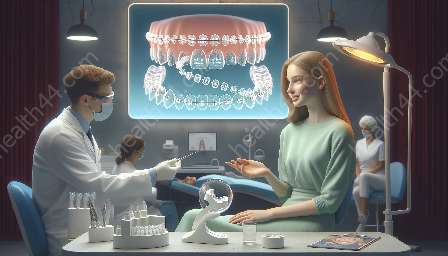The psychological impacts of dental aesthetics are a significant aspect of overall well-being, as they can influence an individual's self-esteem, confidence, and social interactions. The appearance of one's teeth has long been associated with perceptions of attractiveness and success, making it a crucial aspect of one's self-image. Additionally, advances in dental treatments, such as Invisalign, have revolutionized the field of dental aesthetics, offering individuals the opportunity to enhance their smiles discreetly and effectively.
Understanding the Psychological Impacts of Dental Aesthetics
The connection between dental aesthetics and psychological well-being is profound. Research has shown that individuals with perceived dental imperfections may experience feelings of self-consciousness, embarrassment, and low self-esteem. This can impact various aspects of their lives, including social interactions, professional opportunities, and overall happiness. Conversely, individuals with improved dental aesthetics often report higher levels of confidence, a more positive self-image, and increased satisfaction with their appearance.
Self-Esteem and Confidence
The condition of one's teeth can significantly influence their self-esteem and confidence. Individuals with crooked, discolored, or missing teeth may feel insecure about their smile, leading to a lack of confidence in social situations and professional environments. Conversely, individuals with well-aligned, bright, and aesthetically pleasing smiles often exude confidence and approach social interactions with greater self-assuredness.
Social and Professional Interactions
Dental aesthetics play a pivotal role in shaping how individuals are perceived in social and professional settings. A healthy, attractive smile is often associated with traits such as warmth, sincerity, and success, while dental imperfections may lead to unfair judgments or biases. For many individuals, addressing dental aesthetic concerns can lead to improved social interactions, enhanced communication, and greater career opportunities.
Emotional Well-Being
The emotional impact of dental aesthetics should not be underestimated. Feeling dissatisfied with one's smile can lead to feelings of sadness, frustration, and even depression. On the other hand, achieving a smile that one is proud of can contribute to a positive outlook on life and improved emotional well-being.
Invisalign and Advancements in Dental Aesthetics
With the introduction of innovative treatments such as Invisalign, individuals now have access to discreet, comfortable, and effective options for improving their dental aesthetics. Invisalign aligners offer a clear, removable alternative to traditional braces, allowing patients to straighten their teeth without the visibility and restrictions associated with metal braces. This advancement in dental technology has transformed the experience of enhancing one's smile, making it more convenient and aesthetically appealing.
Psychological Benefits of Invisalign
The psychological implications of Invisalign extend beyond the physical enhancement of one's smile. Patients undergoing Invisalign treatment often report increased confidence and reduced self-consciousness during the straightening process. The ability to improve dental alignment without the conspicuousness of traditional braces can alleviate concerns related to appearance, leading to a more positive experience and mindset throughout the treatment journey.
Conclusion
Ultimately, the psychological impacts of dental aesthetics are profound and interconnected with various aspects of an individual's life. Addressing dental aesthetic concerns can lead to tangible improvements in self-esteem, confidence, social interactions, and emotional well-being. The availability of advanced treatments such as Invisalign has further contributed to enhancing the psychological experience of improving one's smile, offering individuals a discreet and comfortable path to achieving dental aesthetics they can be proud of.


